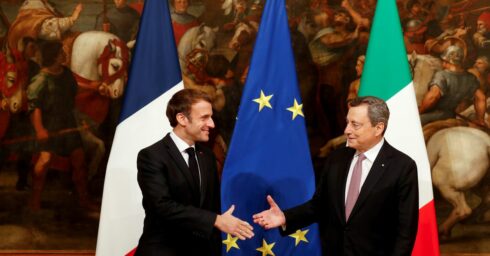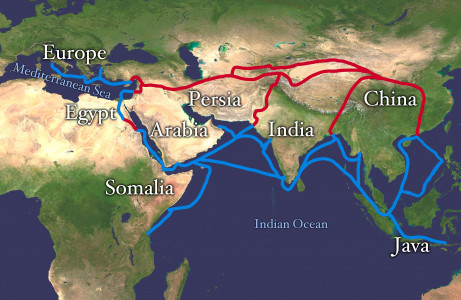Written by Piero Messina
While Europe and its mainstream media grapple with the fourth wave of the Covid pandemic, French President Emanuel Macron continues his policy of grandeur with a view on the Mediterranean. On November 26, Macron and the Italian Prime Minister Mario Draghi signed the “Quirinale Treaty”, so called for the name of the building where the offices of the presidency of the Italian Republic are located. That document is not only the plot of a commercial and strategic agreement but it is also the paradigm of a geopolitical strategy of France, which aims to dominate the Mediterranean. Italy, once a great power on the world scene, continues its decline in a satellization process, which began in the 90s. Italy and France are “dearest enemies”, it is useless to deny it.
Thanks to the agreement with Italy, Paris completes its policy of controlling the Mediterranean after having signed a military alliance with Greece and signed close cooperation agreements with Egypt.
It is the second “treaty” which risks putting offside the fundamental reasons of the European Union. Paris was also the protagonist of the highly contested “Aachen Treaty”, signed on January 22, 2019. The central knot of the agreement signed in Aachen revolves around a cooperation clause in military development projects and mutual defense in the event of aggression. A replay of what is expected in the NATO context. Why did France and Germany have to sign such an agreement, if both countries join NATO? The advantages hang on the side of Berlin: with this treaty it pushes towards the sharing of the permanent seat in the United Nations Security Council between France and Germany. The German army, inhibited since the end of the Second World War, would finally have access to a nuclear arsenal. The French one.
Returning to the treaty that binds Italy and France, it should be remembered that the two countries never share strategic and diplomatic visions in their projection on the Mediterranean. Indeed, they were bitter opponents.
A fundamental example is the Libya dossier. In 2011, when the French and Anglo-Americans launched the attack on Libya and decided to eliminate Gaddafi, from a political, economic and military point of view, it would have been better for Italy not to support the blitz. And perhaps follow the conduct of Berlin which, in line with Russia and China, abstained in the United Nations Security Council from voting on the resolution in favor of intervention in Libya. On the economic level, then, for over twenty years we have witnessed a pressing French penetration into the Italian economic life: banks, insurance companies, energy, industry, food, large distribution, telecommunications. Today, the treaty signed at the Quirinale literally hands over what remains of Italy to its historical enemy: France.
Interested spectators of this new alliance are the two major global key players, the United States and China. The Biden administration will have welcomed with a sigh of relief the document’s call to “safeguard common European security and strengthen the capabilities of Europe of Defense, also working for the consolidation of the European pillar of NATO”. The words spoken by the French president about the “brain death” of the Atlantic Pact still ring in the ears of the Americans, not more than two years ago. In the background, however, the prospect of a “European defense” remains.
China too has good reasons to worry about this new Franco-Italian axis. Italy had been the only European country to formally join the Silk Road project. The agreement with Paris changes the narrative. The French vision prevails, which sees China as a commercial partner but above all a systemic rival.
On a formal level, the Quirinale Treaty is made up of 12 articles, with a road map to make the agreements operational. Here are the fundamental points for a correct geopolitical reading.
FOREIGN AFFAIRS – To bring to global level the priorities identified by the Treaty, and in particular: to strengthen the fight against terrorism, organized crime, violations of human rights, including trafficking in human beings, illicit trafficking and cooperation in the cyber space, as well as the fight against the proliferation of weapons of mass destruction. Defend an ambitious WHO reform, drawing lessons from the Covid-19 crisis; support European leadership in the reform of the WTO; consolidate cooperation for the stability of the Mediterranean, Africa, the Middle East and the Indo-Pacific area. Strengthen the coordination of the respective diplomatic networks, through the intensification of consultations.
SECURITY AND DEFENSE – Principle of mutual assistance in the event of armed aggression on their respective territories, by virtue of the NATO and EU treaties; relaunch of the Italian-French Defense and Security Council with the Foreign and Defense Ministers; new cooperation between the respective aeronaval groups.
SPACE – Strengthen the European space strategy and consolidate the competitiveness and integration of the space industry of the two countries. In the area of access to space, the parties support the principle of a European preference through the development, evolution and coordinated, balanced and sustainable use of institutional launchers Ariane and Vega; support for the European launch base in Kourou, in French Guiana.
CROSS-BORDER AND POLICE COOPERATION – Creation of a cross-border cooperation committee, also involving local and regional realities; improve cross-border connections, in particular continue coordination on the completion of the Turin-Lyon work with the aim of achieving full operation of the tunnel and its access sections and in the management of the Fréjus and Mont Blanc tunnels; negotiations on a cross-border health cooperation and civil protection agreement; confirmation of the mixed border police brigade and creation of a joint operational unit.






The common denominator between these two head of state and head of government is that they have been both bankers in the service of the Kosher Nostra financial mafia and are both Freemasons,: Macron for Rothschild and Draghi for Goldman Sachs. They basically work for the same people. The undeclared intent of these two most sinister individuals is to aggravate the ongoing economic strife in both their respective countries and put the hard squeeze on what is left of the middle class pushing it below the povery line or to the bare susistence level. Draghi, as many of us know in Italy in the Resistance, has the role of managing a fire sale of Italian enterprises at bargain basement prices to the likes of American, French, German and British interests and reducing Italy to a land of serfs.
One nefarious point to highlight pertains to security agreements. What they are not divulging for obvious reasons is that when full-scale revolts break out in both countries, these two rascals have secretly agreed to send their police and military units to “assist” the other nation in putting down dissent.
Just look at these two and tell me who in their right minds would vote for either of them.
Unfortunately voters in many countries have no choice: the choices are either pile of sh%t #1 or pile of sh%t #2. That is the result of a rigged political system supported by the compliant whores in the media.
The European Central Bank, the Rothschilds